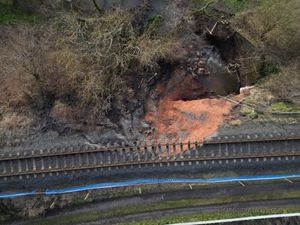Leak allegations ‘nonsense’, says haulage association executive
Rod McKenzie has denied briefing the media about a meeting between fuel industry chiefs and the Cabinet Office to discuss possible petrol shortages.
A senior figure at the Road Haulage Association (RHA) has branded claims by the Transport Secretary that he was behind the leak that sparked the panic buying of fuel as “nonsense”.
Ministers have said the leak of fuel industry chiefs’ concerns that petrol and diesel stocks were at two-thirds of normal levels sparked the rush among drivers to fill up.
Rod McKenzie, managing director of policy and public affairs at the RHA, has been cited as the source of the leak – a claim he denies.
But Grant Shapps doubled down on the claims, telling Sky News’ Trevor Phillips On Sunday programme: “There was a meeting which took place about 10 days ago, a private meeting in which one of the haulage associations decided to leak the details to media, and that has created, as we have seen, quite a large degree of concern as people naturally react to those things.”
Mr McKenzie told the PA news agency: “The allegation against me is nonsense.
“I was not in the meeting. I was not briefed about the meeting afterwards. I certainly didn’t brief any journalists about the meeting about which I knew nothing.
“It is entirely without foundation.”
Mr McKenzie said the current shortage of lorry drivers had been a long time in the making and was a result of a “cocktail of chaos” including a pre-existing shortfall, the pandemic and Brexit.
He said the industry had been short of around 50,000 drivers before Brexit, while a further 20,000 had left after the UK quit the EU.
In addition, 40,000 trucker training tests were cancelled during the pandemic, leaving a shortage of more than 100,000 drivers.
“There is a cocktail of chaos here, it’s not one single thing – I appreciate the Government is briefing that it’s all about Covid-19, but there is a historic shortage in this country,” he said.
Although some employers were now offering salaries in excess of £50,000 to recruit British drivers, Mr McKenzie said it was unclear if they would stay at that level.
“It is good to see salaries rising, it is long overdue. Truckers do a great public service job and they need to be properly paid,” he said.
“But of course that is only part of the package, because the other is about conditions – roadside conditions are pretty poor.”
Mr McKenzie warned that the current shortage could get worse if action was not taken, as the average age of UK lorry drivers was 57 and not enough young drivers were replacing those that retired.
“I was at a roadside truck stop last week – there were 70 trucks parked up and one lavatory between them, and that puts women off going into the profession and it puts young Brits off generally,” he said.
Mr McKenzie said that as well as a lack of toilets and showers, there were relatively few safe parking facilities in the UK and drivers were often not treated well by employers and customers.
“I think one of the things we need to address in this country is the way we treat and regard truckers, and a lot of them talk about the very bad treatment they get at distribution centres when they’re delivering – they’re told to wait or they are shouted at,” he said.
“Most of us in that job don’t have that sort of relationship with customers, with stakeholders, with bosses or whatever, so there is a real holistic need to address all these problems together.”





